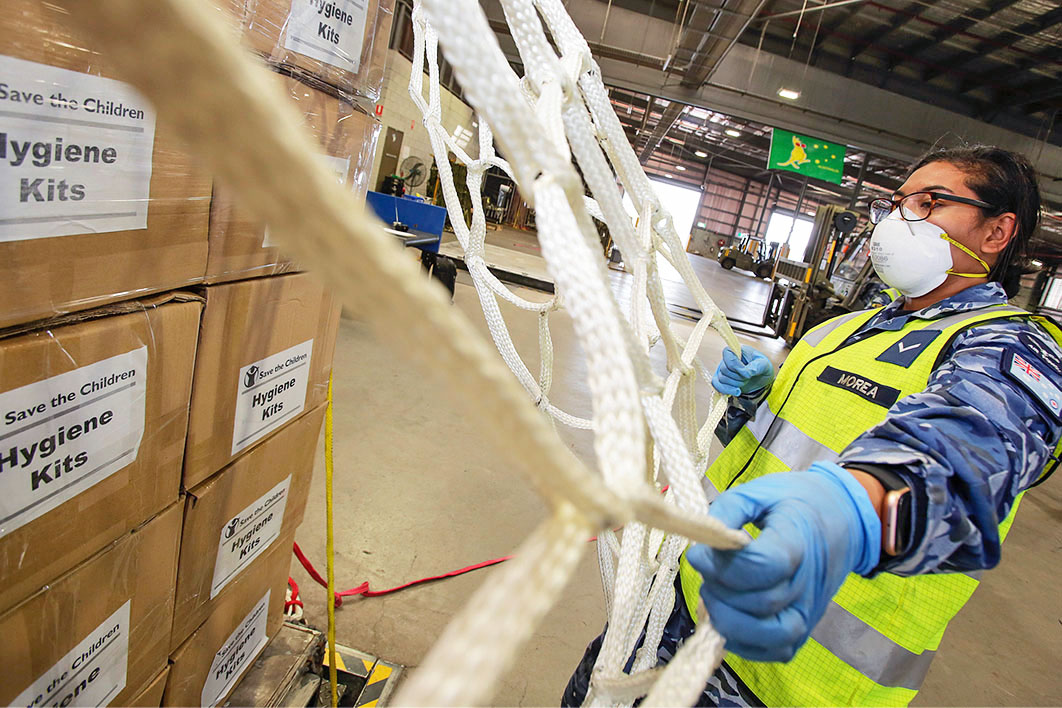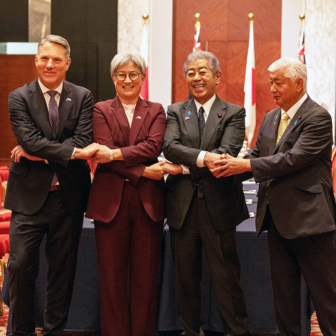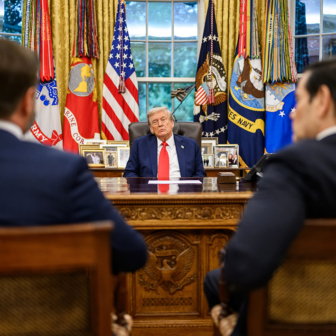In early April, while Covid-19 was transforming the planet, US secretary of state Mike Pompeo and Australian prime minister Scott Morrison spoke by phone. They agreed that Australia and the United States would coordinate efforts to help Pacific island and ASEAN countries respond to the coronavirus pandemic. The two ANZUS allies are wary that China will use the current crisis to increase its influence in the Asia-Pacific region, and are seeking to reinforce their role as aid, trade and investment partners.
With the Morrison government eager to be “partner of choice” for the Pacific islands, Australia and its allies have been stepping up their engagement in the region. Australia and New Zealand have been at the forefront of the response not only to Covid-19 but also to Cyclone Harold, a category-5 cyclone that traversed the region in early April causing devastation and loss of life in Solomon Islands, Vanuatu, Fiji and Tonga.
The Australian and New Zealand defence forces have been transporting relief supplies to these cyclone-affected nations. Canberra and Wellington have also funded the regional Covid-19 response through a joint team led by the World Health Organization, or WHO, and the Pacific Community, the main intergovernmental technical agency responsible for public health in the islands’ region.
The United States has committed US$27 million, mainly for its three Freely Associating States in the northern Pacific (Palau, Marshall Islands and Federated States of Micronesia). As part of a €2 billion global initiative, the European Union will also redirect €119 million towards support for coronavirus responses in the Pacific, with funding allocated to fifteen Pacific islands countries and the four European colonies in the region. France has used its military forces based in New Caledonia to transport aid to neighbouring Vanuatu and Fiji.
Despite Western concern about China’s intentions in the region, many island governments are eager to diversity their economic and diplomatic ties beyond traditional partners and have welcomed South–South solidarity from China and other nations. Over the past decade island nations have promoted the New Pacific Diplomacy through the Pacific Small Island Developing States group at the United Nations, stressing they don’t see the need to choose between old allies and new partners.
In the midst of this geopolitical tussle, many Pacific nations have been extending their trade and aid links with India, Indonesia, Korea, Cuba and Middle East states, even as they maintain longstanding ties with Japan, France and the ANZUS allies. Taiwan has also been active, seeking to retain its four remaining diplomatic allies in the Pacific — Nauru, Tuvalu, Palau and Marshall Islands — after Kiribati and Solomon Islands switched diplomatic ties from Taipei to the People’s Republic of China during 2019.
As part of this geopolitical manoeuvring, China is seeking to extend its bilateral and regional partnerships in the region during the pandemic. On 10 March, Chinese ambassadors in the islands coordinated a video conference between Pacific health ministers and China’s National Health Commission. Beijing has set up a “China–Pacific Island Countries Anti-Covid-19 Cooperation Fund” worth US$1.9 million and has shipped medical equipment and supplies to Vanuatu, Fiji, Papua New Guinea, Samoa and other island nations.
Direct support from the Chinese government is matched by initiatives from state-owned and private corporations. These companies are eager to use the current pandemic to strengthen partnerships with local governments and Pacific business networks, and to protect and advance their economic investment in infrastructure, tourism, and resources. As China analyst Graeme Smith has written in Inside Story, “Chinese capital and development finance appear to be driven primarily by market opportunities and the presence of Chinese companies on the ground in the destination country.”
Chinese corporations involved in regional infrastructure projects are now branching out to supply medical equipment. These goodwill gestures aim to burnish the image of both companies and government, at a time of growing criticism that censorship in China delayed an immediate global response to the pandemic.
One player is CCECC South Pacific Ltd, the Oceania subsidiary of the China Civil Engineering Construction Corporation, or CCECC. Established with the approval of China’s State Council in 1979, the company initially worked in Africa but now operates in nearly fifty countries, including Tonga, Solomon Islands, Tuvalu, Fiji, Vanuatu, Papua New Guinea, Cook Islands — and Australia.
Over the past decade, CCECC and other Chinese companies have built infrastructure projects in Vanuatu, often of vast dimensions and varying quality. These include a new parliament building, a national convention centre, a national sports complex, an office complex for the prime minister and a new building for the Melanesian Spearhead Group, the sub-regional organisation hosted in Port Vila. Last year, CCECC won a tender to build a new finance ministry complex. Using concessional loans from the Chinese government, CCECC is also building roads and high schools on the islands of Tanna and Malekula.
As a “good corporate citizen,” CCECC leapt at the opportunity to support Vanuatu’s preparedness for the coronavirus pandemic. The company provided twelve container houses to be used as a new isolation centre at the Vila Central Hospital, and ambassador Zhou Haicheng presented a cheque for US$100,000 to Vanuatu’s caretaker government to support efforts to prevent Covid-19 infections (as yet, there are no confirmed cases in the country).
On 11 April, a plane chartered by CCECC South Pacific Ltd delivered 4.3 tonnes of medical supplies to Vanuatu. According to CCECC, the plane unloaded “ventilators, masks, and testing kits provided by the Chinese government, some procured by the Vanuatu government and some donated from Guangdong Province and overseas Chinese communities in Vanuatu.”
The Chinese charter was still at the airport the next day, when a RAAF C-17 Globemaster flew from Amberly air force base carrying humanitarian supplies. Despite gaining approval to land from Vanuatu officials, the RAAF pilot was worried the Chinese plane was still on the narrow runway. The RAAF flew back to Australia, only returning the next day to deliver the supplies. “There is growing concern within Defence about whether the hold-up was intentional to delay the Australian plane from landing,” reported Sydney Morning Herald foreign affairs correspondent Anthony Galloway.
“We have raised our concerns with officials both in Vanuatu and in appropriate places with the Chinese government,” Australian foreign minister Marise Payne told David Speers on the ABC’s Insiders. “I don’t know whether it was deliberate or not, David. I wasn’t there.”
This diplomatic jousting over Vanuatu, played out through willing journalists, is not new. In 2018, Galloway’s predecessor as national security correspondent, David Wroe, wrote a series of stories about a purported Chinese military base on the island of Santo. Citing American and Australian security analysts, Wroe alleged that the Vanuatu government was in discussions with China about a military facility in Luganville. The claim was quickly denied by then prime minister Charlot Salwai and foreign minister Ralph Regenvanu (who had been at the Non-Aligned Movement conference in Azerbaijan, highlighting his country’s nuclear free and demilitarised status).
The following month, Wroe reported on a potential security threat from a proposed Chinese fish farm in French Polynesia. “The massive fish farm project on Hao Atoll has raised eyebrows in Canberra because it will sit next to the airport the French military previously used to carry out nuclear tests in the Pacific,” he wrote. “Concerns in Canberra focused on speculation Tianrui could seek a lease on their airport, giving Beijing a strategic foothold 11,000 kilometres into the Pacific Ocean.”
The story raised amused eyebrows in Tahiti, where government officials assured me that France would be unlikely to allow China to build a military base in its Pacific colony! Leaving the Nine-owned newspaper, Wroe went on to bigger things — he now serves as a media adviser to Foreign Minister Payne.
Under the FRANZ agreement between Australia, New Zealand and France, the defence forces of all three countries have been transporting much needed medical aid and cyclone relief to Vanuatu in the aftermath of Cyclone Harold. This cooperation enhances the reputation of the Western allies at a time when France is seeking to extend its influence in the region, tarnished by three decades of nuclear testing and the Rainbow Warrior attack. Under both Coalition and Labor governments, Canberra has signed strategic partnership agreements with Paris, perceiving France as a bulwark against Chinese influence in the islands.
But this strategic perspective is challenged by the economic interests of New Caledonia and French Polynesia, the two French dependencies that are full members of the Pacific Islands Forum. China is the largest export market for nickel ore mined in New Caledonia, while successive governments in Tahiti have sought to increase Chinese tourism and investment, as well as exports of fish, agriculture and black pearls. Speaking at a seminar on China’s Maritime Silk Road last November, French Polynesia’s president Edouard Fritch saw little difference between investors from China and other nations.
“It’s the common interest shown by private investors from China and successive French Polynesian Governments that has led to China including French Polynesia in its Silk Road initiative,” Fritch said. “We are open to Chinese private investors, just as we were to American, French, European, Samoan or New Zealand investors, in key economic sectors that open up our markets, such as tourism or aquaculture… If they are honest, they are all worthy of our friendship, whatever their nationality.”
With fifty-eight confirmed cases of Covid-19 — at a time when the France is dealing with more than 133,000 cases and 25,531 deaths — French Polynesia has been seeking medical support from China.
In another example of Chinese corporate largesse, the chief executive officer of Tahiti Nui Océan Foods, Wang Chen, has donated 10,000 masks and other medical supplies to the local government in Tahiti. After delays in obtaining personal protective equipment, or PPE, from Paris, Wang helped facilitate an Air Tahiti Nui flight from Shanghai on 6 April.
Desperate to create jobs in the outer islands, the government has been wooing Wang since December 2016, when Tahiti Nui Océan Foods lodged its proposal for the US$300 million fisheries project on Hao atoll. (Fritch’s government even presented Wang with the honorific of Commandeur dans l’ordre de Tahiti Nui in May 2018.)
Tahiti Nui Océan Foods is a subsidiary of the Chinese corporation Tianrui Group Co Ltd. Chaired by billionaire Li Liufa, the parent company operates from Ruzhou City, Henan Province, with investments in cement, foundries, tourism, mining, logistics, finance and other industries. The long-delayed initiative on Hao, however, had yet to commence operations when French Polynesia went into lockdown in response to Covid-19. Despite this, the company’s chief executive has promoted China’s interest in deeper ties.
“In China, there are also local governments which would be delighted to do something for their sister cities in French Polynesia,” says Wang. “Medical institutions have an urgent need for medical supplies, including personal protection equipment. Because of the grave situation in Europe, China has become an important hope for this region. Chinese pharmaceutical products can now be exported.”
Another Chinese player on the pandemic scene is the Jack Ma Foundation, which has been distributing medical supplies and PPE to the United States, Europe and developing countries, especially in Africa. Now, Ma is reaching out to the Pacific Islands.
The Foundation was established in December 2014 by Jack Ma, co-founder and former executive chairman of China’s Alibaba Group, a major technology and e-commerce corporation. A member of the Chinese Communist Party, the billionaire is typical of the “capitalist roaders” who have flourished in the People’s Republic since the late 1970s. Ma retired from Alibaba last year as China’s richest man and, like Bill Gates, now devotes his time to international philanthropy through his foundation.
In the first use of the newly established Pacific Humanitarian Pathway — established during a teleconference of Pacific Islands Forum foreign ministers on 7 April — the Ma Foundation has supplied tens of thousands of face masks to the islands. To avoid duplication and administrative burden on small island developing states, regional agencies want overseas donors to use this humanitarian pathway to distribute urgently needed medical supplies, equipment and technical assistance.
The Forum’s secretary-general, Dame Meg Taylor, told me that this highlights a collective response to global challenges from the eighteen member countries. Most smaller island states have so far avoided Covid-19 by working together to control their borders, she says. “If you don’t have coordination, you’re going to get every donor ringing every government saying ‘we can put together a charter for you.’ Countries are saying, if you want to bring in an aircraft, you have to abide by our protocols… It’s very clear — island leaders are very concerned about any outside people coming in to their country at all.”
Australia and New Zealand have used their own corridor to distribute assistance, although Marise Payne and NZ deputy prime minister Winston Peters joined island foreign ministers to set up the Humanitarian Pathway. Ironically, the first shipment through the regional coordinating mechanism came not from Australia but from China.
The Jack Ma Foundation flew 50,000 KN95 facial masks and 20,000 other protective masks from Shanghai to Nadi, Fiji, on 20 April. Most of the equipment will be distributed to the four Forum island countries and territories that already have confirmed cases of Covid-19: Papua New Guinea, Fiji, French Polynesia and New Caledonia. The rest will remain in stockpile for future use, with distribution managed through the joint WHO/Pacific Community regional team responding to the pandemic.
The WHO’s central coordination role in the Pacific response has complicated Australia’s diplomacy. The Morrison government, buffeted by international criticism of its climate and refugee policies, is wary of UN multilateralism. In a 2019 foreign policy lecture, Scott Morrison expressed disdain for “negative globalism” and an “unaccountable internationalist bureaucracy.”
Morrison has, for example, followed the Trump administration in refusing new funding for the Green Climate Fund, a vital source of climate adaptation finance for island states. “I don’t need to send a cheque via Geneva or New York or wherever it has to go,” he told me at last year’s Forum leaders meeting in Tuvalu. (The GCF Secretariat is actually based in Incheon, South Korea, as the prime minister should know — Australia was previously co-chair of the Fund’s, and Australian diplomat Howard Bamsey served as the secretariat’s executive director.)
Following Donald Trump’s decision to suspend funding to the WHO, China responded with a further grant of US$30 million to the UN agency. Now Australia has echoed Trump’s call for an international review of the WHO. Foreign Minister Payne has also issued a public call for a review of the pandemic, even before other OECD countries had agreed to the proposal. The subsequent public jousting with China’s ambassador to Australia, Cheng Jinye, gives lie to the notion that “we’re all in this together.”
Even as the US and Australian governments have criticised China’s purported influence over the UN agency, the important role of the WHO office in the Pacific has been acknowledged by Marise Payne. “Australia shares some of the concerns of the United States in relation to the operation of the World Health Organisation,” she said on Insiders. “But importantly, for us, particularly in the Indo-Pacific, in the Pacific itself and in Southeast Asia, we do some extremely valuable work with the World Health Organization. They rolled out in early February a regional impact process for the coronavirus pandemic in the Pacific, which both Australia and New Zealand have funded. Their multilateral impact in the Pacific is very significant.”
As with climate policy, the current brawl over the WHO highlights how Australia’s global strategic interests and alliance with the United States can come into conflict with the realities of the Pacific islands. But at a time of geopolitical change and rising US-China tension, many of Australia’s neighbours are still eager to work with partners from all corners of the globe. As Dame Meg says: “I think our island countries want to help themselves. It’s like the climate issue — the voice of the Pacific needs to be heard.” •




